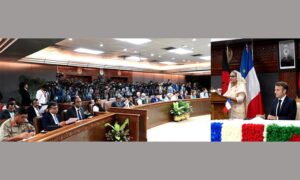
MUJIB100 PHOTO ARCHIVE | Photo Collected
On the events surrounding Sheikh Mujib’s return from Mianwali Jail to Dhaka
A few days after the Pakistan forces’ humiliating defeat in the Eastern War Theatre and the surrender of occupation troops at Dhaka on December 16, 1971, Bangladesh’s government-in-exile, as well as the Indian Prime Minister Indira Gandhi, were left worried about Bangabandhu Sheikh Mujibur Rahman languishing in Mianwali Jail in Pakistan.
Pakistan’s would-be president, Zulfiqar Ali Bhutto, who was in New York attending heated UN Security Council meetings, had to air dash to Rawalpindi after he was informed by General Yahya Khan that he had resigned from his office as president of Pakistan and military commander.
Bhutto had been appointed the chief martial law administrator of Pakistan.
Indira Gandhi received a top secret message that the Rawalpindi flight carrying Bhutto was scheduled for a stopover at Heathrow Airport in London. The Indian PM hurriedly called a meeting of the war cabinet in New Delhi at her South Block office to discuss Bhutto’s journey home. She wanted a reliable points-person who would be present for Bhutto’s arrival at Heathrow, so she could get an intelligence feed.
India desperately wanted to learn what Bhutto was thinking — whether he would release Rahman and let him return home, or carry out the Pakistan military court’s verdict of death.
The meeting was attended by Durga Prasad Dhar, head of policy planning in the Ministry of External Affairs; Ram Nath Kao, chief of RAW; PN Haksar, the prime minister’s principal secretary; and TN Kaul, the foreign secretary.
A plan was drawn, with no guarantee of acquiring the vital intelligence of the fate of Sheikh Mujib. Incidentally, a highest ranked Pakistan bureaucrat, Muzaffar Hussain, former chief secretary of the government of East Pakistan and posted in Dhaka, had become a prisoner of war (POW) along with 93,000 military, other combatants, civil officers, and families.
Hussain was staying as a VIP guest at the official residence of DP Dhar. On the other hand, his wife, Laila Hussain, was visiting London when the war broke out in December and remained stranded. Both husband (in Delhi) and wife (in London) were communicating with each other through diplomatic channels.
Fortunately, Sashanka S Banerjee, an Indian diplomat in the Indian mission in London, had befriended Laila Hussain. Indira knew that Laila and Bhutto had been good friends. Thus, the South Block decided to play a one-off diplomatic “summit” at the VIP lounge, the Alcock and Brown Suite, at Heathrow airport. Banerjee persuaded Laila to meet Bhutto at the airport lounge and ask him if he could help in getting her husband released from Delhi.
The two friends, Laila and Bhutto, met at Heathrow airport. The meet and greet turned out to be a historic diplomatic thriller. Bhutto responded to Laila’s emotional appeal for help in getting her husband released from Indian custody. He pulled her aside and whispered to Laila a very sensitive, top-secret message for the Indian prime minister, writes Banerjee in his memoir.
“Laila, I know what you want. I can imagine you are [carrying a request] from Mrs Indira Gandhi. Do please pass a message to her, that after I take charge of office back home, I will shortly thereafter release Mujibur Rahman, allowing him to return home. What I want in return, I will let Mrs Indira Gandhi know through another channel. You may now go.”
The Indian High Commission in London urgently shot out a priority message to the South Block, based on Laila’s encounter with Bhutto. Indira Gandhi was excited that Bhutto had sent out a positive message.
Meanwhile, within hours, a diplomatic message came from Islamabad confirming the authenticity of Laila’s report.
Bangladesh leaders received a secret message from the South Block regarding the release of Sheikh Mujib — the architect of Bangladesh’s independence would first land in London and then fly from there to Dhaka via Delhi.
Bhutto dared to over-rule the death sentence handed out by a military court in Rawalpindi and released Mujib on January 8, 1972. On January 10, 1972, Mujib returned as a hero to a war-ravaged homeland — but an independent Bangladesh.
Saleem Samad is an independent journalist, media rights defender, and recipient of Ashoka Fellowship and Hellman-Hammett Award. He could be reached at saleemsamad@hotmail.com; Twitter @saleemsamad.







